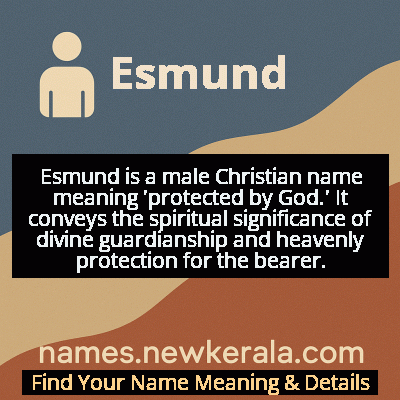Esmund Name Meaning & Details
Origin, Popularity, Numerology Analysis & Name Meaning of Esmund
Discover the origin, meaning, and cultural significance of the name ESMUND. Delve into its historical roots and explore the lasting impact it has had on communities and traditions.
Name
Esmund
Gender
Male
Origin
Christian
Lucky Number
4
Meaning of the Name - Esmund
Esmund is a male Christian name meaning 'protected by God.' It conveys the spiritual significance of divine guardianship and heavenly protection for the bearer.
Esmund - Complete Numerology Analysis
Your Numerology Number
Based on Pythagorean Numerology System
Ruling Planet
Uranus (Rahu)
Positive Nature
Strong sense of order, loyal, practical, and disciplined.
Negative Traits
Stubborn, overly serious, rigid, and prone to feeling restricted.
Lucky Colours
Blue, gray.
Lucky Days
Saturday.
Lucky Stones
Blue sapphire.
Harmony Numbers
1, 7, 8.
Best Suited Professions
Managers, engineers, accountants, organizers.
What People Like About You
Dependability, discipline, practicality.
Famous People Named Esmund
Esmund Harmsworth
British nobleman and politician
2nd Viscount Rothermere, prominent newspaper proprietor and Conservative politician
Esmund Knight
Actor
English character actor known for his work with Powell and Pressburger, appeared in films like 'The Life and Death of Colonel Blimp' and 'Black Narcissus'
Esmund Samuel
Scholar and historian
Noted for his contributions to Jewish studies and historical research in British academia
Name Variations & International Equivalents
Click on blue names to explore their detailed meanings. Gray names with will be available soon.
Cultural & Historical Significance
The name experienced a revival during the Victorian era when there was renewed interest in medieval and Anglo-Saxon names. In Christian tradition, Esmund represents the concept of divine providence and God's protective embrace over individuals. The name has maintained a presence in English-speaking Christian communities, particularly among families seeking names with strong religious meaning and historical depth, though it has never reached widespread popularity, preserving its distinctive and traditional character.
Extended Personality Analysis
Individuals named Esmund are often perceived as having a calm, protective nature with a strong sense of responsibility. They tend to be reliable and steadfast, embodying the name's meaning of divine protection through their supportive and guardian-like qualities toward family and friends. Esmunds typically display thoughtful deliberation in their actions and decisions, preferring careful consideration over impulsive behavior.
There's often an air of traditionalism and dignity associated with Esmunds, who may value heritage and continuity. They frequently possess strong moral convictions and a sense of duty, making them trustworthy companions and responsible community members. While sometimes reserved in new situations, Esmunds reveal depth of character and loyalty once relationships are established. Their protective instinct extends beyond physical safety to emotional and spiritual well-being of those they care about, making them natural caretakers and advisors.
Modern Usage & Popularity
In contemporary times, Esmund remains a rare and distinctive choice, primarily used by parents seeking a name with strong historical roots and Christian significance. It has never ranked among the top 1000 names in most English-speaking countries in recent decades, maintaining its status as an uncommon but meaningful selection. The name sees occasional use in traditional Christian families, particularly those with Anglo-Saxon heritage or an appreciation for medieval history. Modern usage tends to favor the slightly more common spelling 'Esmond,' though both variants preserve the name's dignified, old-world charm and religious connotations.
Symbolic & Spiritual Meanings
Symbolically, Esmund represents divine guardianship and spiritual protection in the Christian tradition. The name embodies the concept of being sheltered under God's care, serving as a constant reminder of faith and divine oversight. Metaphorically, it suggests a bridge between earthly existence and heavenly protection, with the named individual potentially serving as an instrument or reflection of God's safeguarding presence in the world. The name carries connotations of strength through faith, resilience through divine support, and the idea that true protection comes from spiritual rather than merely physical sources. It symbolizes the Christian belief in providential care and the intersection of human life with divine purpose.

